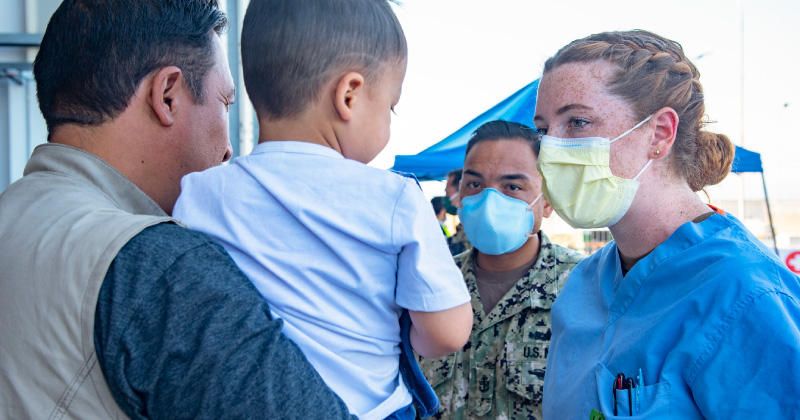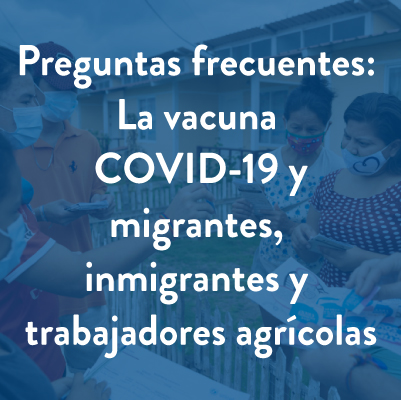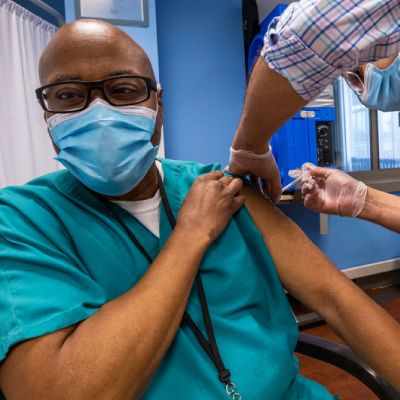- Who We Are
- Clinician Employment
- Publications
- Witness to Witness (W2W)
- El Premio Kugel & Zuroweste a la Justicia en la Salud
- Your Voice Matters: Photovoice Project
Mon, 09/13/2021 | by MCN Admin


Tens of thousands of Afghan refugees are arriving across the US – and all of them will receive a health assessment in the coming weeks. Once they arrive on US soil, Afghan families are connected to local refugee resettlement agencies who then assist them with their next steps – finding them housing, providing case management, in some cases offering ESL classes and job training – so they can start their new lives in the US. They’ll also be connected to a primary care provider close to their new homes, for a health screening within their first weeks. This screening may fall to local health departments, health centers, or other clinics. In Maryland, Lois Wessel, FNP, DNP, FNP, a family nurse practitioner and a faculty member at the School of Nursing and Health Studies at Georgetown University, provides these initial screenings for refugees at a local health center. Now, Wessel and her team are seeing Afghan families every day, brought to the clinic from the Dulles Expo Center in Washington, DC, where they are staying after their arrival from Afghanistan.
After this required screening, some of these families will stay on at the health center as their medical home. Others will move on to clinics that are closer to the bus lines that run from their homes, to private care that has been recommended to them by their community or case worker, or elsewhere. This provider reshuffling is occurring across the country. As refugees arrive as new patients in health centers throughout the states, Wessel has outlined some of the lessons she’s learned that may serve clinicians who discover their new patients are Afghan refugees.
Be prepared with trauma-informed mental health care
“People may be resistant to mental health counseling,” Wessel said. “They are pretty traumatized.” She sees widespread depression and PTSD affecting newly arrived refugees, which is to be expected. Health centers need to be prepared with sufficient mental health counseling support, ideally with mental health professionals who speak Pashto or Farsi, or with the provision of appropriate interpretation services.
Be welcoming
Wessel says that, at the beginning of her first visit with a new arrival, she takes time to welcome the family to the US. “I say, ‘I know your journey to get here was hard, and I’m so glad you are here,’” Wessel recounted. Wessel’s own family descended from refugees, and she makes sure that patients know that “we’re a country that welcomes refugees,” she said.
Trained medical interpreters are a must
Many of the fathers in the families served as official interpreters for the US government. Even those who did not serve as interpreters often have very good to excellent English language skills. However, they should not serve as interpreters in the clinical setting, even if they insist. Wessel finds that husbands may wish to interpret for wives, but the patient is better served if an official and impartial medical interpreter is brought in instead. Wessel navigates this issue by clarifying to the husband that, although he may be an interpreter, Wessel’s clinic has medical interpreters who are trained specifically around medical issues, and Wessel must use the interpretation services provided by the clinic.
Be prepared for large families
For those scheduling their initial physical exams, “Afghan families tend to be large,” Wessel noted. With an hour dedicated to their initial physical exam, a family of eight – two parents and six children – would spend the entire day in the waiting room for eight hours of appointments. “They don’t have food, the children are bouncing off the walls… so I suggest breaking it up over two days,” she said.
Watch lead levels over time
“One of the things we’re seeing a lot of is that the kids have elevated lead levels,” Wessel noted. Increased blood lead levels are more prevalent in immigrant and refugee children. CDC recommends all newly entered migrant children, between six months and 16 years of age, and anyone pregnant or lactating should be screened for BLL within the first 1-2 months, with follow-up testing after three to six months. Wessel recommends following lead levels of all Afghan refugees, children and adult, over time to watch for elevated levels, adding that sometimes these levels may increase during their initial months in the US, as some families may be placed in substandard housing where they are exposed to lead. Anemia, which goes hand-in-hand with elevated lead levels, is another thing to watch. Finally, Afghan families may use Surma, a traditional eye makeup used on infants, that is often contaminated with lead. Clinicians should support patients in maintaining their cultural practice but educate them on finding and using a product fabricated without lead.
Pay particular attention to measles and polio
Afghanistan is currently experiencing an outbreak in measles, and the country ranks seventh in the world for measles cases. Afghanistan is one of just two countries in the world with both wild and vaccine-derived poliovirus in circulation. New Afghan refugees are receiving one dose of the MMR (for six months to 64 years) and one dose of IPV (ages six months and up). However, clinicians serving newly arrived Afghan refugees should watch for signs and symptoms of measles or polio, as the risk of disease is increased in this population.
Be prepared to provide extra case management
Refugees are navigating a health system that is complicated and fragmented even for first-language English speakers. “Some of the immunizations that they need, we don’t have [in the clinic] for adults. They have to go to CVS, for example, to get a Hep A vaccine. That’s another layer of complexity,” Wessel noted. The refugees will need ongoing primary care and a champion – preferably who speaks their own language – who can help them determine their next steps in their health care.
Long-term public assistance is in flux
Much of the public assistance provides housing and more support for at least eight months. While we remain hopeful for additional access to a range of services, and some access varies by location, clinicians should be aware that program funding at present is in flux. Battling PTSD and depression, navigating a new culture and language, some families may not be integrated into the community within the timeframe of public assistance provision. They may decide to move, and may need assistance in continuing health care after this time.
Outreach and community health worker teams should watch for changes to low-income community housing access
Organizational capacity and resources of refugee resettlement agencies vary from location to location. Clinicians are encouraged to be mindful of the effect of an influx of newly arrived refugees on the availability of housing among some long-time residents of the community.
Resources
Many resources exist to aid clinicians caring for newly arrived Afghan refugees.
Immigrant, Refugee, and Migrant Health Domestic Guidance, from the CDC, shows the guidelines that Wessel’s clinic follows.
NRC-RIM has COVID-19 resources for Afghan new arrrivals.
Hesperian Health Guides offers numerous resources in Pashto, Dari, and Farsi.
MCN’s recent webinar series on language access may offer more guidance on promising practices in interpretation in a clinical setting: Community-Based Interpretation and the Road to Language Access, Session 1 and Session 2.
Afghan Health offers several PSAs on lead poisoning in Dari/Farsi and Pashto, as well as numerous other resources for Afghan refugees in Washington State.
Afghan Clinic offers resources and consultations around health in Dari, and has a video about the COVID-19 vaccine in Dari.
Many resources exist to aid clinicians caring for newly arrived Afghan refugees.
Immigrant, Refugee, and Migrant Health Domestic Guidance, from the CDC, shows the guidelines that Wessel’s clinic follows.
NRC-RIM has COVID-19 resources for Afghan new arrrivals.
Hesperian Health Guides offers numerous resources in Pashto, Dari, and Farsi.
MCN’s recent webinar series on language access may offer more guidance on promising practices in interpretation in a clinical setting: Community-Based Interpretation and the Road to Language Access, Session 1 and Session 2.
Afghan Health offers several PSAs on lead poisoning in Dari/Farsi and Pashto, as well as numerous other resources for Afghan refugees in Washington State.
Afghan Clinic offers resources and consultations around health in Dari, and has a video about the COVID-19 vaccine in Dari.
This article was updated on 9/15/21 to provide clarification on blood lead level information and community housing access.
Got some good news to share? Contact us on our social media pages above.
Return to the main blog page or sign up for blog updates here.







